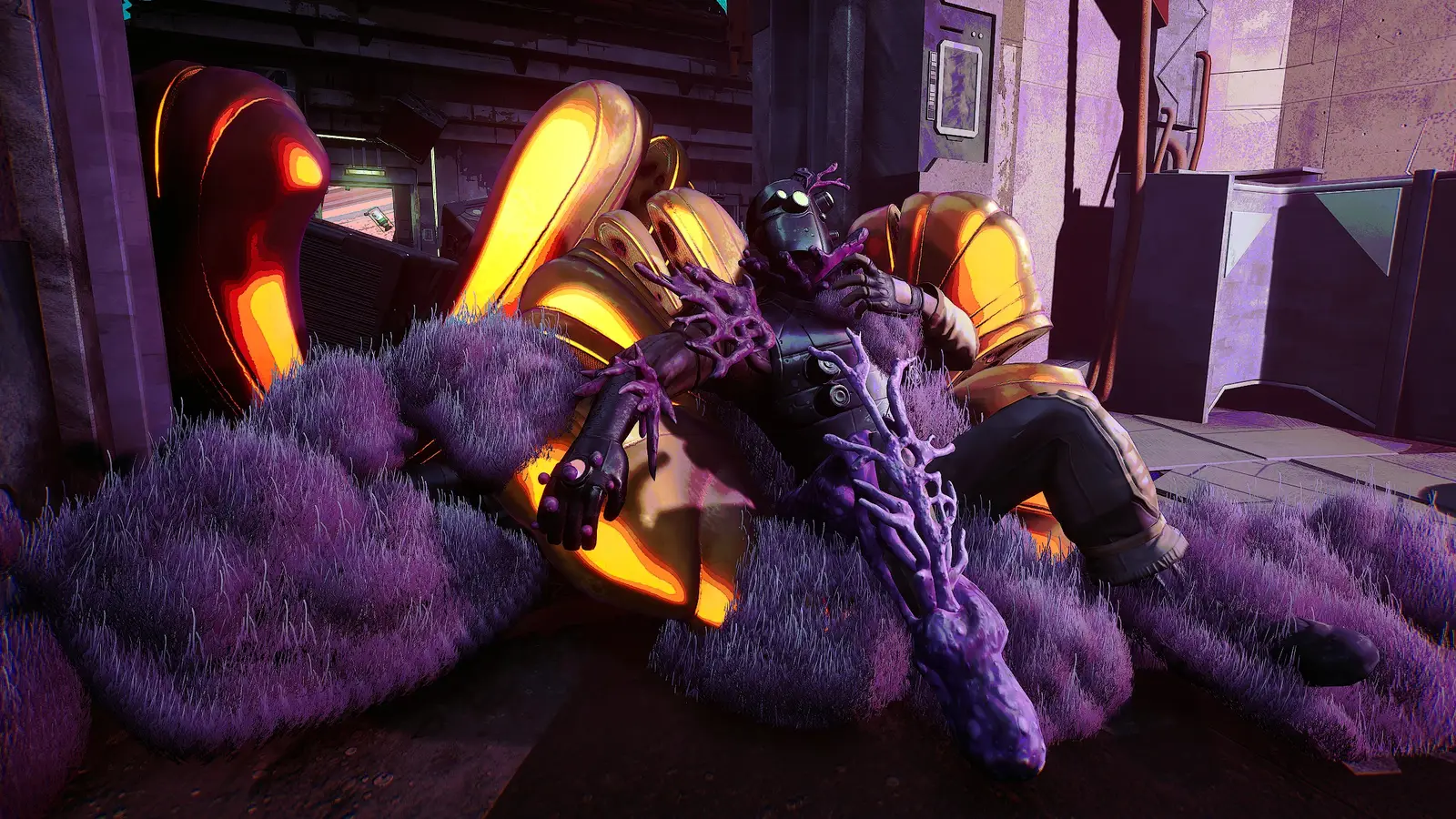
What if there was a game like Powerwash Simulator about death? Ambrosia Sky is an upcoming immersive sim that explores the idea, placing players in the role of an intergalactic cleaner named Dalia, who’s been tasked with investigating a sentient fungal outbreak within an agriculture colony and laying those it affected to rest.
Ambrosia Sky is the debut title from developer Soft Rains, which is home to an impressive array of industry veterans who’ve worked on titles like Skyrim and the Fallout franchise. Narrative director Kaitlin Tremblay is no stranger to futuristic settings or games about death, previously serving as narrative designer on Watch Dogs: Legion and lead writer on A Mortician’s Tale, but Ambrosia Sky still marks a lot of new territory for them.
ScreenRant spoke with Tremblay to discuss how the game separates itself from traditional sci-fi, the art of environmental storytelling, and Ambrosia Sky’s many inspirations.
How Ambrosia Sky Is Pushing Sci-Fi Boundaries
Developers Weren’t Looking To Repeat Previous Projects
Agriculture in space is a well-tread concept, but developers didn’t want to simply repeat western sci-fi tropes, nor did they want to rehash past projects. Because some of Ambrosia Sky’s team previously worked on Watch Dogs: Legion, Tremblay recalls, “When we got started, one of the things we talked about was robots and AI companions, and I was like, ‘I’m not writing another AI.’”
“Part of that came from needing to do something different,” Tremblay continues, “but more so, it was about what I find interesting about sci-fi: I’ve always been drawn to more fantastical sci-fi, really inspired by folklore – how can we incorporate folklore into sci-fi? I think there’s a lot of interesting room in sci-fi to confront what we do and don’t know.”
“That fueled a lot of this different approach to sci-fi, and we really tried to integrate this level of folklore and what that means for people in a setting that tends to have a much more authoritative sense of itself. I really liked how those two things were in conflict: the hard sci-fi nature of ‘we know this is how science works’ confronted with the ways in which we react to things that we don’t know, and finding the space in between those.”
The Vast Environmental Storytelling Of Ambrosia Sky
The World Of The Cluster Is Designed Entirely Around Lore
Tremblay is a huge proponent of the importance of worldbuilding as a way to drive story – she even released an entire book on the subject, Collaborative Worldbuilding for Video Games, in 2023 – and has tried to imbue every aspect of Ambrosia Sky with lore. They describe it as two separate stories: Dalia’s homecoming and the emotional baggage that comes alongside revisiting one’s hometown, and the story of The Cluster, the once-bustling agricultural colony based in Saturn’s rings.
For a space mostly inhabited by infestation, every facet of the world still manages to tell a story, with everything about its architecture helping “stitch together this coherent understanding of what the place is.” Even in the absence of life, what players explore still ties back to former inhabitants. “I wanted to layer that with actual lives – most of the characters you’re going to encounter are dead, so we really leaned into the idea of found narratives to really give voice to the people who lived here.”
We can, to a certain degree, determine what death means for us, and I think there’s a power in that.
Traversal in Ambrosia Sky is as varied as its fungi, often switching things up with changing gravity or Dalia’s ability to change perspective via grappling hook. All of this also helps tell a story, with Tremblay describing how the game’s level designers incorporate narrative: “They’re always like, ‘What’s the story here? How do people use this space? How did they used to?’ I hope everywhere you turn and look, you’ll learn something about the world too.”
How Ambrosia Sky Finds Beauty In Death
Dalia’s Death Rites Bring Hopeful Melancholy
When I tell Tremblay that – despite its subject matter – I find Ambrosia Sky less dark than games like Watch Dogs, they’re surprised, but ultimately agree, pointing out how my sentiment has been echoed during hands-on previews. “People play the demo and talk about how it’s not as heavy as they’re expecting, or there’s more hope in it than they’re expecting. That’s what I really love: yes, we’re dealing with heavy themes, but that’s not the only emotional vector through which to engage.”
Much of this hopefulness is derived through Dalia, whose emotional arc revolves around closure: “How can we confront what we’ve done in the past and find ways to continue to live? How do we forgive ourselves?” Each death Dalia encounters has its own death rites to be performed, as well as a recording of their last will, which is the deceased “talking about their feelings on death, what they want done with their body, and why they’ve consented to the Ambrosia Project.”
“There is something beautiful in being able to have different characters throughout the game be able to speak to their own feelings on death and showcase the range of it in the game – you’ll have people who have very different feelings about their own impending death and why they’re consenting to the Ambrosia Project, and I think there’s a sense of hope in that. We can, to a certain degree, determine what death means for us, and I think there’s a power in that.”
“I also think there’s something comforting in being a witness to somebody like Dalia,” Tremblay continues, “who can’t save these people – she’s here to do what she’s here to do, but she can witness them and she can honor them. There’s a sad kind of beauty in that, there’s something nice and heartwarming and hopeful in knowing that you can be witnessed in such a way.”
The Inspirations Behind Ambrosia Sky
Tremblay Found Ideas Across A Myriad Of Mediums
With its hybridized clean ‘em up mechanics, Ambrosia Sky’s gameplay demo has inspired a lot of comparisons online, ranging from System Shock and Metroid to Powerwash Simulator. Tremblay says job sims and adjacent genres were a particularly big influence, pointing to games like Hardspace: Ship Breaker and Powerwash Simulator because of how they incorporate mechanics that “engage with the world in a way we are typically not asked.”
“That’s what I seek out a lot as a player,” Tremblay says. “Those games with more novel mechanics were really influential, because they were able to take this familiar sense of what we know about first-person controls, but then apply it in a way that’s nonviolent, that’s tackling different goals and inhabiting different player fantasies.” Narratively, they point to Clair Obscur: Expedition 33, saying that “the way they talk about death and introduce grief into their story and their mechanics was really affirming.”
Inspiration came from beyond the gaming space as well, with Tremblay spotlighting 2018’s Annihilation playing a big part because of what it “says about humanity’s symbiosis with ecosystems.” When I asked Tremblay about musical influences, they realized that, for almost the entirety of the writing process, they’d been listening to “Love Me More” by Mitski on repeat, saying that, “There’s just something about it that really got into the right emotional space for me.”
It’s no surprise such a layered game would have equally diverse inspirations, and Tremblay says that diversity will also be reflected in each in-game death ritual. “We are trying to make each one feel really full of the person that you are saying goodbye to,” Tremblay says, “so there are these really focused vignettes about character that combine art and music and level design in a really specific way.” Ambrosia Sky is slated to welcome players into The Cluster sometime soon, and I can’t wait to start cleaning – and probably crying.



